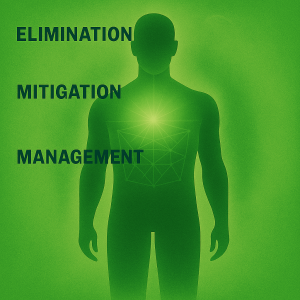ATP Reset evaluation involves a review of history and symptoms, including a functional medicine timeline, an ATP narrative, and an ART assessment to develop an ATP profile of past and current healthcare challenges. Exposures (mold, toxins, viruses, parasites, and blood-borne pathogens) can compromise the immune system, other systems, and detoxification and drainage. Stressors (dental issues, food, and life events) are considered along with triggers from experiences, memories, and family history. The evaluation, challenges, and clinical response present as a stress patterning that Dr. Sparks works with patients to address.
ATP Reset uses three steps to pursue release: Elimination, Mitigation, and Management.
Elimination
The most effective response to physical challenges is to eliminate them (when possible). Exposures may be physically addressed with supplements and pharmaceuticals while facilitating the detoxification and drainage process. Dental issues can be addressed with the assistance of a qualified biological dentist, while foods that cause inflammation can be avoided.
Current life events and past triggers (experiences, memories, and family history) may present as energetic challenges. Divorce, unemployment, and adverse childhood events may create stress that impacts day-to-day health as they are happening–and long after they are concluded. Releasing energetic challenges requires developing an awareness of the related energy, transforming that energy, and releasing the stress associated with it. These three steps are the Awareness Transformation Process (ATP).

Mitigation
After all challenges that can be eliminated are addressed, the remaining challenges may be mitigated, and additional steps may be taken to prevent or minimize the recurrence of stress patterning from challenges eliminated. Mitigation includes:
- Continued empirical treatment to address exposures, stressors, and triggers.
- Educating the patient to avoid or reduce exposures that might compromise health.
- Promoting lifestyle changes to improve health, including exercise, sleep, and dietary changes.
- Recommending supplements to respond to exposures, promote detoxification, and increase energy.
- Helping patients to understand the emotions and beliefs that may be affecting their healing.
Management
As the patient and Dr. Sparks work to mitigate challenges to the patient’s health, the patient should transition into maintenance, where they have implemented exposure avoidance and reduction strategies, made lifestyle changes, and adopted positive beliefs to improve their health. Supplementation may be reduced or used on an as-needed basis to manage their health. In management, patients may not need to be seen regularly, but only as new issues arise.
